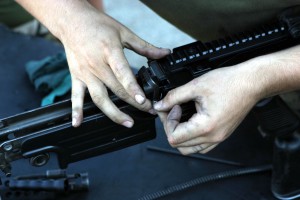As FFLs, we want to comply with the law, and avoid unnecessary regulatory entanglements, violations, or undue attention from ATF or other regulatory bodies. It may be difficult at times to actually determine if the activity you engage in or would like to apply for actually requires a Type 07 “Manufacturers” FFL. The law and ATF’s interpretation has developed over time. Technology has introduced new methods of manufacturing as well as adding value and changing the appearance of firearms. This has brought about questions regarding the definition of manufacturing, and what makes a manufacturer of firearms by federal law.
What are the best sources or publications for guidance on determining if what I do qualifies as manufacturing?
It’s essential that FFLs, especially gunsmiths/dealers, and applicants for a FFL have a good understanding of this concept. This article doesn’t address criminal issues; it deals with proper licensing for the activity to be conducted as a federal firearms licensee (FFL). This article tries to explain and clarify some important points, but FFLs and potential FFLs should read and become familiar with certain publications and terms. Other than understanding pertinent sections of the Gun Control Act (GCA) and corresponding regulations, FFL should read the following:
Revenue Ruling 55-342 (Treasury Publication)
ATF Rul. 2009-1
ATF Rul. 2010-10
I assemble guns from component parts about 3 or 4 times per month. Do I need a manufacturer’s license?
ATF has determined that certain types of “assembling” of firearms, depending on the frequency and nature of the activity is considered manufacturing. ATF has determined that firearms dealers can assemble firearms on an individual basis, but not in large “lots for purposes of sale or distribution without a manufacturer’s license” (Revenue Ruling 55-342).
In the case of a person consistently assembling firearms from component parts as in the question, “3 or 4 times per month”, it’s likely that the person meets the definition of a “manufacturer” of firearms. It is likely that the above example qualifies the person as being “engaged in the business” of manufacturing firearms. The person should be licensed as a Type 07 “Manufacturer”.
I’m a gunsmith who does special upgrades for my customers. How do I know if what I do is considered manufacturing?
Every case of this type is different and requires particular examination of the details to determine the answer. It’s sometimes a matter of semantics, the extent and frequency of the activity a person is engaged in, and especially if the activity qualifies as being “engaged in the business”. FFLs should have a good understanding of the term “engaged in the business”. ATF attempts to give guidance for FFLs in Ruling 2010-10.
ATF ruling 2010 – 10 gives guidance with respect to assisting gunsmith-dealers in determining whether they are actually engaging in the business of “manufacturing” firearms per the definition and relevant rulings. The ruling lists 5 things an FFL gunsmith/dealer could do in order to facilitate ATF’s determination of whether or not they should be licensed as a Type 07 “Manufacturer” of firearms. However, complying with the requirements of this list, maybe a little cumbersome for some business owners. On the other hand, if you are in a “grey area”, it may be best to follow the advice of the ruling and document your activities as indicated.
Best Advice
If you have read ATFs publications and have a perception that you are making, producing, upgrading or otherwise manufacturing firearms for livelihood and profit, it’s likely that ATFs evaluation of your business will conclude the same. If you are a gunsmith/dealer and are engaged in an activity that likely requires a license such as assembling firearms from components, you should apply and get the proper license. Some FFLs may fall into a grey area. In these cases it’s always the best policy to ask ATF for an opinion. This is preferable to continuing to engage in the activity and have ATF discover the issue during a compliance inspection.
ATF investigators will examine your business and ensure that you are properly licensed for the activity you engage in. It’s always better to get ahead of that game and ensure things are in order prior to ATF making the determination for you.
©2014 Firearms Licensing and Consulting Group LLC, FFL Consulting Group, FFLConsultinggroup.com All Rights Reserved. See “legal” section for privacy policy.

